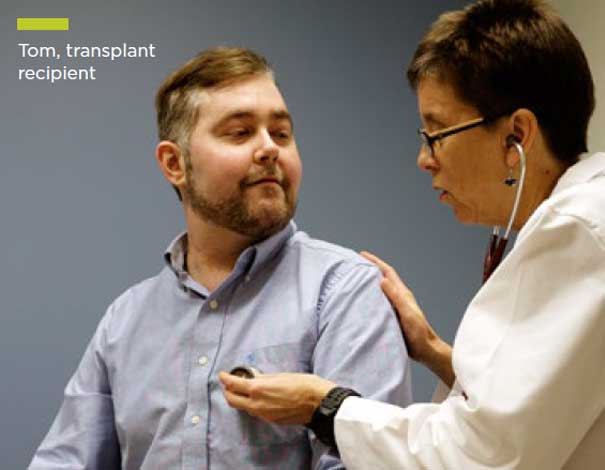The first anniversary of your transplant is an important milestone in your recovery. It’s a time when you’re likely getting ready for your 1-year checkup with your transplant center. It can also be a time to look back, to reflect on all you’ve been through, and to look ahead and set goals for your future.
Moving around, getting stronger
Getting regular exercise can help you build your strength and endurance, fight fatigue (being tired), reduce pain and improve your quality of life. If your doctor says it’s okay, you can set exercise goals like:
- Go for a walk every day. Increase your distance or time.
- Exercise with a friend.
- Do a variety of different activities, like riding a bike, lifting weights or doing yoga.
Eating well
Good nutrition is important to help you feel stronger, keep a healthy weight and stay healthy. For example, getting enough calcium and vitamin D from your food or as a supplement may help protect against thinning bones.
But there are some foods, like grapefruit, that could interact with medicines you’re taking. Ask your transplant team if there are any foods, vitamins or supplements to avoid. And continue to eat a variety of healthy foods every day.
Getting ready for your 1-year checkup
Your 1-year checkup at your transplant center is important for your recovery. Your doctor will check how well you’re doing overall and take care of any problems.
As you plan for your 1-year checkup you may have many different feelings. You might feel hopeful for good test results or worry about test results. Some people feel excited to see their doctors and nurses again. Others feel relieved when the checkup is over. All of these feelings are okay to have.
As you plan for your checkup, write down things that you want to talk to your doctors, nurses or social workers about.
Here are some suggestions to get you started:
- Concerns about side effects from medicines
- Managing graft-versus-host disease (GVHD) or watching for symptoms of GVHD
- Which vaccines you need and when
- Who you’ll see for future checkups
- If you need to make additional appointments with other doctors or specialists
- Concerns about depression, anxiety or PTSD (see story on page 12 for more information)
- Safety of complementary or integrative therapies, like taking a vitamin or getting acupuncture
- Concerns about sexual health
- Which exercises could be helpful
Now is a good time to talk to your transplant center to find out if they’ll be calling you to schedule your checkup, or if you need to make the appointment. If you’ve seen other doctors since your last appointment at your transplant center, ask your transplant center if they have copies of those medical records. Be sure to ask if they are sharing your medical records with your other doctors, too.
It’s also a good idea to have a family member or friend come with you to the appointment to take notes.
Recognizing milestones
As you approach your first anniversary, setting goals, tracking your progress and honoring achievements can be motivating. When you reach a milestone, recognize it with a special activity with family and friends, or simply by reflecting on how far you’ve come and your resiliency
If you have complications from transplant, such as GVHD, a clinical trial may offer a treatment option for you. We can help you explore and join clinical trials. To learn more visit ctsearchsupport.org or call 1 (888) 814-8610.

